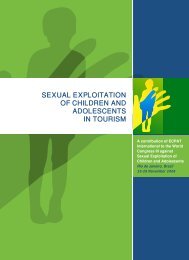to download the document in PDF format - Child Centre: Expert ...
to download the document in PDF format - Child Centre: Expert ...
to download the document in PDF format - Child Centre: Expert ...
You also want an ePaper? Increase the reach of your titles
YUMPU automatically turns print PDFs into web optimized ePapers that Google loves.
In <strong>the</strong> Norms, three sections give mean<strong>in</strong>g <strong>to</strong> <strong>the</strong> substantive sections: def<strong>in</strong>itions; <strong>the</strong>preamble; and general obligations. Although articulated last, <strong>the</strong> def<strong>in</strong>itions sectionis important when def<strong>in</strong><strong>in</strong>g <strong>the</strong> scope of four terms: transnational corporation, 97 o<strong>the</strong>rbus<strong>in</strong>ess enterprise, 98 stakeholder, 99 human rights and <strong>in</strong>ternational human rights. 100 Thescope of entities bound by <strong>the</strong> Norms is considerable: large, transnational or mult<strong>in</strong>ationalcorporations, <strong>the</strong>ir supply cha<strong>in</strong>s and o<strong>the</strong>r associated bus<strong>in</strong>esses are bound <strong>to</strong> respecthuman rights <strong>in</strong> both <strong>the</strong>ir home and host countries. It seems, however, that <strong>the</strong> Norms donot b<strong>in</strong>d purely local bus<strong>in</strong>ess enterprises. Similarly, ‘stakeholders’ are also large <strong>in</strong> scope,<strong>in</strong>clud<strong>in</strong>g those affected both directly and <strong>in</strong>directly by an entity’s activities. F<strong>in</strong>ally, <strong>the</strong>scope of ‘human rights’ is broad. The Norms articulate specific rights and <strong>in</strong>struments, but<strong>in</strong>clude <strong>the</strong> ‘catch-all’ rights: “o<strong>the</strong>r human rights treaties” and “o<strong>the</strong>r relevant <strong>in</strong>strumentsadopted with<strong>in</strong> <strong>the</strong> UN system.”As with <strong>the</strong> def<strong>in</strong>itions section, <strong>the</strong> preamble gives mean<strong>in</strong>g <strong>to</strong> <strong>the</strong> Norms. The preambleprimarily does two th<strong>in</strong>gs. First, as stated above, it recognises that while states are primarilyresponsible for human rights, TNCs are not absolved of responsibility. TNCs must ‘promoteand secure’ rights <strong>in</strong> <strong>the</strong> UDHR and ‘respect’ norms conta<strong>in</strong>ed <strong>in</strong> UN treaties 101 and<strong>in</strong>ternational <strong>in</strong>struments. 102 Second, <strong>the</strong> preamble clarifies <strong>the</strong> status of <strong>the</strong> Commentary,call<strong>in</strong>g it “… a useful <strong>in</strong>terpretation and elaboration of <strong>the</strong> standards conta<strong>in</strong>ed <strong>in</strong> <strong>the</strong>Norms[.]” 103The “general obligations” section provides fur<strong>the</strong>r mean<strong>in</strong>g, by articulat<strong>in</strong>g a frameworkthrough which <strong>to</strong> <strong>in</strong>terpret <strong>the</strong> Norms and outl<strong>in</strong><strong>in</strong>g basic obligations. The roles ofTNCs and states are re-stated and <strong>the</strong> concept of ‘sphere of <strong>in</strong>fluence’ is <strong>in</strong>troduced.The Commentary makes clear that “… <strong>the</strong> rema<strong>in</strong>der of <strong>the</strong> Norms shall be read <strong>in</strong> <strong>the</strong>light of this paragraph” and that <strong>the</strong> Norms apply <strong>in</strong> both home and host countries. 104Fur<strong>the</strong>rmore, <strong>the</strong> mean<strong>in</strong>g of ‘promote, secure fulfilment of, respect, ensure respect of andprotect human rights’ is elaborated; and <strong>in</strong>cludes an obligation <strong>to</strong> self-<strong>in</strong>form about <strong>the</strong>impact of corporate activity on human rights so as <strong>to</strong> avoid complicity. 105The substantive provisions <strong>to</strong>uch on many aspects of human rights. The first relevantprovision falls under <strong>the</strong> head<strong>in</strong>g “right <strong>to</strong> security of persons”, whereby TNCs areprohibited from engag<strong>in</strong>g <strong>in</strong> or benefit<strong>in</strong>g from specific human rights abuses. 106 Underthis provision, <strong>the</strong> commentary refers only <strong>to</strong> <strong>the</strong> production and trade of weapons, ando<strong>the</strong>r enforcement products or services. 107 Also under this head<strong>in</strong>g, TNCs that make use ofsecurity provision must do so <strong>in</strong> observance of <strong>in</strong>ternational human rights norms, nationallaws and professional standards of <strong>the</strong>ir host country. 108 Under <strong>the</strong> Commentary, securityarrangements are only <strong>to</strong> be used for “… preventative or defensive services […]” and TNCsare obligated <strong>to</strong> use ‘due diligence’ and ensure <strong>the</strong>y employ only adequately tra<strong>in</strong>ed guardsPrivate Sec<strong>to</strong>r Accountability <strong>in</strong> Combat<strong>in</strong>g <strong>the</strong> Commercial Sexual Exploitation of <strong>Child</strong>ren|33




